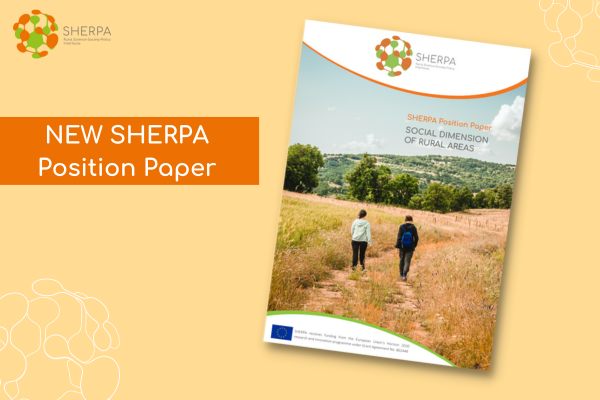Across Europe, rural areas have great potential to become a home for empowered and vibrant local communities. Yet, it is worth noting that “traditional” forms of community organisation are in decline in rural areas, while new forms that could sustain sociability are not yet in place. SHERPA partners and MAPs developed specific recommendations to tackle ongoing issues and trigger rural revitalisation in their Position Paper “Social Dimension of rural areas”.
A stronger rural Europe
A “stronger Europe” is one of the four building blocks of the EU Long-Term Vision for Rural Areas for 2040. In her speech, Ursula Von der Leyen, President of the European Commission affirmed that “rural areas are the fabric of our society and heartbeat of our economy.” For this reason, how to make rural Europe stronger has been at the core of SHERPA’s discussions in 2022, our 3rd Annual Conference and the recently published Position Paper “Social Dimension of rural areas”.
Four sub-topic addressed
Authored by Majda Černič Istenič (University of Ljubljana), this Position Paper is built on the work done, discussions, and evidence gathered by nine of the 41 SHERPA MAPs. The Position Paper acknowledges that obstacles to flourishing rural communities and a good rural life exist. Some of these include low-level participation of people, lack of volunteers and local leaders, insufficient capacity of administrative staff, and inadequate legislation.
The Position Paper investigates those barriers and explores the topic of social dimension in rural areas across four sub-topics:
- Wellbeing and social relationships in rural areas;
- Public goods provisioning and social networks;
- Bridging the rural-urban gap by promoting cultural activities;
- Social inclusion of migrant population in rural areas.
Recommendations
Based on the evidence gathered by the MAPs, this Position Paper lists SHERPA’s recommendations to strengthen well-being and social capital in rural areas from the local to European level. For instance, it advocates for the creation of friendly spaces at the local level. At the national and European levels, it recommends the CAP pay more attention to social capital to strengthen LEADER/CLLD approach.
Last but not least, the Position Paper also gathers existing good practices to revitalise rural areas and enhance their liveability such as the Vunki mano!, an Estonian “social hackathon” to develop new ways of living in rural Estonia, or a financial scheme to develop more flexible housing and renting conditions in rural areas of Wallonia, Belgium.
Published by Carla Lostrangio
